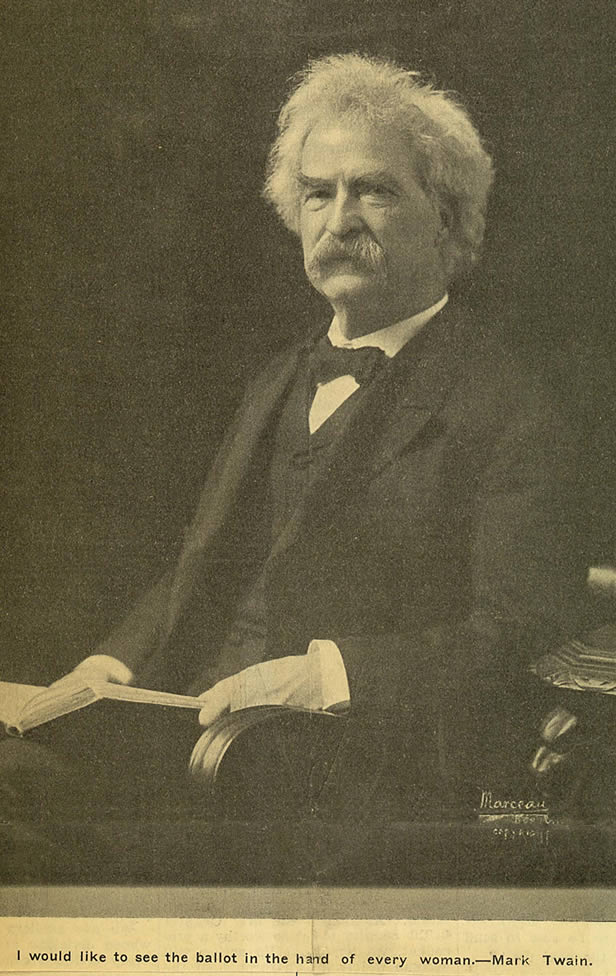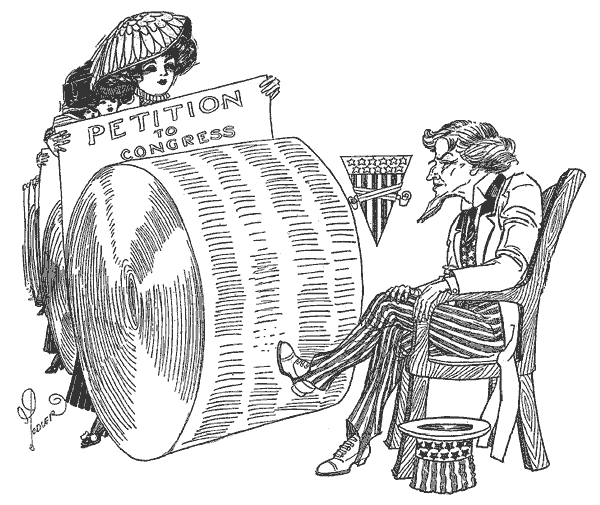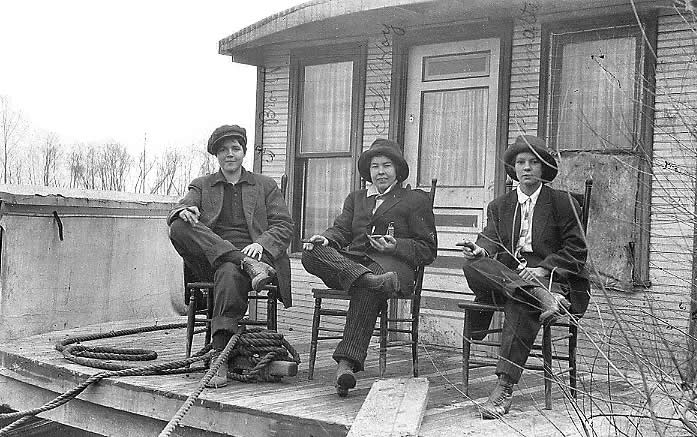

Over the years, Mark Twain changes his mind about female suffrage:
I think I could write a pretty strong argument in favor of female suffrage,
but I do not want to do it. I never want to see the women voting, and gabbling
about politics, and electioneering. There is something revolting in the thought.
It would shock me inexpressibly for an angel to come down from above and ask
me to take a drink with him (though I should doubtless consent); but it would
shock me still more to see one of our blessed earthly angels peddling election
tickets among a mob of shabby scoundrels she never saw before.
- Letter to St. Louis Missouri Democrat, March 1867
Women, go your ways! Seek not to beguile us of our imperial privileges. Content
yourself with your little feminine trifles -- your babies, your benevolent societies
and your knitting--and let your natural bosses do the voting. Stand back --
you will be wanting to go to war next. We will let you teach school as much
as you want to, and we will pay you half wages for it, too, but beware! we don't
want you to crowd us too much.
- Letter to St. Louis Missouri Democrat, March 1867
Our marvelous latter-day statesmanship has invented universal suffrage. That
is the finest feather in our cap. All that we require of a voter is that he
shall be forked, wear pantaloons instead of petticoats, and bear a more or less
humorous resemblance to the reported image of God. He need not know anything
whatever; he may be wholly useless and a cumberer of the earth; he may even
be known to be a consummate scoundrel. No matter. While he can steer clear of
the penitentiary his vote is as weighty as the vote of a president, a bishop,
a college professor, a merchant prince. We brag of our universal, unrestricted
suffrage; but we are shams after all, for we restrict when we come to the women.
- "Universal Suffrage" speech delivered to the Monday Evening Club
about 1875. Reprinted in Mark Twain: A Biography, edited by A. B. Paine
At home, a standing argument against woman suffrage has always been that women
could not go to the polls without being insulted. The arguments against woman
suffrage have always taken the easy form of prophecy. The prophets have been
prophesying ever since the woman's rights movement began in 1848 -- and in forty-seven
years they have never scored a hit.
- Following the Equator
I know that since the women started out on their crusade they have scored in
every project they undertook against unjust laws. I would like to see them help
make the laws and those who are to enforce them. I would like to see the whiplash
in women's hands.
- quoted in The New York Times, January 21, 1901

By 1909 suffragists
considered Clemens an avid supporter. This portrait appeared in the Boston publication
WOMAN'S JOURNAL, Dececmber 26, 1908. The quote has not been verified. (Photo
from
Library of Congress of Congress, American Memory collection.) After seeing
the magazine, Elizabeth Bacon, president of Connecticut's Woman Suffrage Association
wrote to ask Clemens to sign a petition being presented to Congress to request
the submission of a 16th amendment giving women the right to vote. Clemens wrote
on the back of the letter:
I am very glad to sign the petition but I am in terror lest I
should be asked to do something, for I don't do anything now, but rest after
73 years of activity.
- quoted in Mark Twain in the Company of Women, by Laura Skandera-Trombley,
p. 121.

Editorial cartoon
from the WASHINGTON POST, October 31, 1909. Mark Twain signed the petition.
I not only advocate it now, but have advocated it earnestly for
the last fifty years. As to the militant suffragettes, I have noted that many
women believe in militant methods. You might advocate one way of securing the
rights and I might advocate another, they both might help to bring about the
result desired. To win freedom always involves hard fighting. I believe in women
doing what they deem necessary to secure their rights.
- interview
in Chicago Daily Tribune, December 21, 1909, p. 5
 Three young women dressed as men aboard an inland rivers houseboat. From an undated and unpostmarked photo post card from the early 1900s. On the back is pencilled "From Mary Vanpattan (to) Miss Irma Carpenter Sandford, Ind." The names of the young women were written in pencil above the heads of each. Mary Vanpattan is on the right; Ethel Hay is in the middle. There's an indecipherable squiggle in front of the name Broeff above the woman on the left. From the collection of Dave Thomson. |
Quotations | Newspaper Articles | Special Features | Links | Search